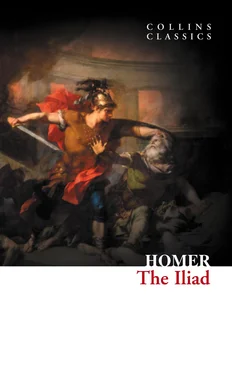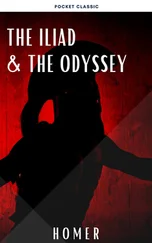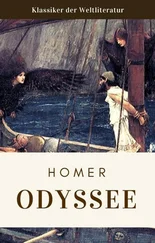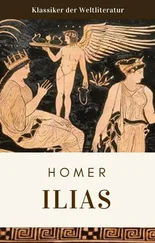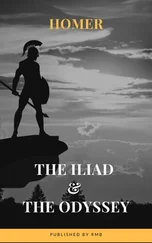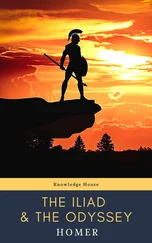“Tyrant, I well deserved thy galling chain,
To live thy slave, and still to serve in vain,
Should I submit to each unjust decree:—
Command thy vassals, but command not me.
Seize on Briseis, whom the Grecians doom’d
My prize of war, yet tamely see resumed;
And seize secure; no more Achilles draws
His conquering sword in any woman’s cause.
The gods command me to forgive the past:
But let this first invasion be the last:
For know, thy blood, when next thou darest invade,
Shall stream in vengeance on my reeking blade.”
At this they ceased: the stern debate expired:
The chiefs in sullen majesty retired.
Achilles with Patroclus took his way
Where near his tents his hollow vessels lay.
Meantime Atrides launch’d with numerous oars
A well-rigg’d ship for Chrysa’s sacred shores:
High on the deck was fair Chryseis placed,
And sage Ulysses with the conduct graced:
Safe in her sides the hecatomb they stow’d,
Then swiftly sailing, cut the liquid road.
The host to expiate next the king prepares,
With pure lustrations, and with solemn prayers.
Wash’d by the briny wave, the pious train
Are cleansed; and cast the ablutions in the main.
Along the shore whole hecatombs were laid,
And bulls and goats to Phoebus’ altars paid;
The sable fumes in curling spires arise,
And waft their grateful odours to the skies.
The army thus in sacred rites engaged,
Atrides still with deep resentment raged.
To wait his will two sacred heralds stood,
Talthybius and Eurybates the good.
“Haste to the fierce Achilles’ tent (he cries),
Thence bear Briseis as our royal prize:
Submit he must; or if they will not part,
Ourself in arms shall tear her from his heart.”
The unwilling heralds act their lord’s commands;
Pensive they walk along the barren sands:
Arrived, the hero in his tent they find,
With gloomy aspect on his arm reclined.
At awful distance long they silent stand,
Loth to advance, and speak their hard command;
Decent confusion! This the godlike man
Perceived, and thus with accent mild began:
“With leave and honour enter our abodes,
Ye sacred ministers of men and gods!
I know your message; by constraint you came;
Not you, but your imperious lord I blame.
Patroclus, haste, the fair Briseis bring;
Conduct my captive to the haughty king.
But witness, heralds, and proclaim my vow,
Witness to gods above, and men below!
But first, and loudest, to your prince declare
(That lawless tyrant whose commands you bear),
Unmoved as death Achilles shall remain,
Though prostrate Greece shall bleed at every vein:
The raging chief in frantic passion lost,
Blind to himself, and useless to his host,
Unskill’d to judge the future by the past,
In blood and slaughter shall repent at last.”
Patroclus now the unwilling beauty brought;
She, in soft sorrows, and in pensive thought,
Pass’d silent, as the heralds held her hand,
And of look’d back, slow-moving o’er the strand.
Not so his loss the fierce Achilles bore;
But sad, retiring to the sounding shore,
O’er the wild margin of the deep he hung,
That kindred deep from whence his mother sprung:
There bathed in tears of anger and disdain,
Thus loud lamented to the stormy main:
“O parent goddess! since in early bloom
Thy son must fall, by too severe a doom;
Sure to so short a race of glory born,
Great Jove in justice should this span adorn:
Honour and fame at least the thunderer owed;
And ill he pays the promise of a god,
If yon proud monarch thus thy son defies,
Obscures my glories, and resumes my prize.”
Far from the deep recesses of the main,
Where aged Ocean holds his watery reign,
The goddess-mother heard. The waves divide;
And like a mist she rose above the tide;
Beheld him mourning on the naked shores,
And thus the sorrows of his soul explores.
“Why grieves my son? Thy anguish let me share;
Reveal the cause, and trust a parent’s care.”
He deeply sighing said: “To tell my woe
Is but to mention what too well you know.
From Thebe, sacred to Apollo’s name
(Aetion’s realm), our conquering army came,
With treasure loaded and triumphant spoils,
Whose just division crown’d the soldier’s toils;
But bright Chryseis, heavenly prize! was led,
By vote selected, to the general’s bed.
The priest of Phoebus sought by gifts to gain
His beauteous daughter from the victor’s chain;
The fleet he reach’d, and, lowly bending down,
Held forth the sceptre and the laurel crown,
Intreating all; but chief implored for grace
The brother-kings of Atreus’ royal race:
The generous Greeks their joint consent declare,
The priest to reverence, and release the fair;
Not so Atrides: he, with wonted pride,
The sire insulted, and his gifts denied:
The insulted sire (his god’s peculiar care)
To Phoebus pray’d, and Phoebus heard the prayer:
A dreadful plague ensues: the avenging darts
Incessant fly, and pierce the Grecian hearts.
A prophet then, inspired by heaven, arose,
And points the crime, and thence derives the woes:
Myself the first the assembled chiefs incline
To avert the vengeance of the power divine;
Then rising in his wrath, the monarch storm’d;
Incensed he threaten’d, and his threats perform’d:
The fair Chryseis to her sire was sent,
With offer’d gifts to make the god relent;
But now he seized Briseis’ heavenly charms,
And of my valour’s prize defrauds my arms,
Defrauds the votes of all the Grecian train;
And service, faith, and justice, plead in vain.
But, goddess! thou thy suppliant son attend.
To high Olympus’ shining court ascend,
Urge all the ties to former service owed,
And sue for vengeance to the thundering god.
Oft hast thou triumph’d in the glorious boast,
That thou stood’st forth of all the ethereal host,
When bold rebellion shook the realms above,
The undaunted guard of cloud-compelling Jove:
When the bright partner of his awful reign,
The warlike maid, and monarch of the main,
The traitor-gods, by mad ambition driven,
Durst threat with chains the omnipotence of Heaven.
Then, call’d by thee, the monster Titan came
(Whom gods Briareus, men Ægeon name),
Through wondering skies enormous stalk’d along;
Not he that shakes the solid earth so strong:
With giant-pride at Jove’s high throne he stands,
And brandish’d round him all his hundred hands:
The affrighted gods confess’d their awful lord,
They dropp’d the fetters, trembled, and adored.
This, goddess, this to his remembrance call,
Embrace his knees, at his tribunal fall;
Conjure him far to drive the Grecian train,
To hurl them headlong to their fleet and main,
To heap the shores with copious death, and bring
The Greeks to know the curse of such a king.
Let Agamemnon lift his haughty head
O’er all his wide dominion of the dead,
And mourn in blood that e’er he durst disgrace
The boldest warrior of the Grecian race.”
“Unhappy son! (fair Thetis thus replies,
While tears celestial trickle from her eyes)
Why have I borne thee with a mother’s throes,
To Fates averse, and nursed for future woes?
So short a space the light of heaven to view!
So short a space! and fill’d with sorrow too!
O might a parent’s careful wish prevail,
Читать дальше
